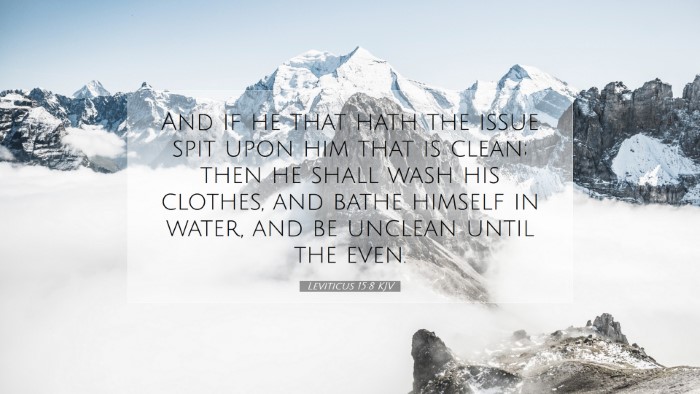Commentary on Leviticus 15:8
Leviticus 15:8 states: "If the man with the discharge spits on someone who is clean, that person must wash his clothes and bathe with water, and he will be unclean until evening." This verse is a part of the laws concerning bodily discharges, detailing the implications of ritual purity in ancient Israelite society.
Understanding the Context
The Book of Leviticus predominantly addresses the holiness and purity required of the Israelites, serving as a guide for maintaining both physical and spiritual cleanliness. This particular chapter (15) delves into laws related to bodily discharges, outlining procedures for purification. The underlying themes emphasize God's holiness and the necessary separation from impurity.
Insights from Public Domain Commentaries
Matthew Henry's Commentary
Matthew Henry elucidates the implications of ritual purity in his commentary. He notes that the instructions regarding what constitutes impurity are comprehensive, reflecting God’s character and the gravity of uncleanliness. Henry suggests that such laws symbolize a greater spiritual principle—that the effects of sin ripple outwards, affecting not only the sinner but also those around him. Thus, the act of a man with a discharge contaminating a clean person illustrates how sin can spread. This necessitates a communal awareness of holiness.
Moreover, Henry draws attention to the necessary actions required when one comes into contact with impurity. The washing of clothes and bathing serves as both a physical act of cleanliness and a symbolic gesture of returning to a state of purity, making it clear that while Israel was called to be a holy nation, they were also required to actively participate in maintaining that holiness.
Albert Barnes' Notes
Albert Barnes, in his notes, emphasizes the cultural and religious significance of purity laws in Israel. He illustrates that a discharge from the body was seen as a sign of potential moral or physical decay and that contact with such a condition required cleansing rituals. Barnes interprets this as part of a broader framework of societal and ecclesiastical order, establishing that ritual purity was vital for maintaining the community's health and reflecting God’s standards.
Furthermore, Barnes highlights the impact of communal worship on individual purity. He explains that since the Israelites were a tightly-knit community bound by covenant, each member’s purity affected the group as a whole. Thus, the necessity for cleansing after contact with impurity serves both a physical and a spiritual role in protecting the worshiping community from defilement.
Adam Clarke's Commentary
Adam Clarke provides a detailed exposition of the verse, particularly focusing on the symbolic aspects of the rituals prescribed. Clarke states that the act of spitting is significant; it is an involuntary bodily function that symbolizes contempt and disgust, suggesting that the implications of bodily discharges extend beyond the physical realm into the relational dynamics of community.
Clarke also expounds upon the washing of clothes and bathing process as a means of restoring one’s status in the community. He underlines that these regulations not only served a hygienic purpose but were instrumental in teaching the importance of personal responsibility for maintaining communal purity. This reflects a perpetual engagement with one’s relationship with God and the consequences of one’s actions on others.
Theological Implications
From the analyses of these three commentators, several theological insights emerge:
- God's Holiness: The holiness of God necessitates a distinction between the clean and the unclean, which this verse exemplifies.
- Community Responsibility: The laws illustrate that individual purity reflects on the community's holiness; therefore, believers must actively pursue a life free from sin.
- Symbolism of Purification: The acts of washing and bathing symbolize a deeper spiritual cleansing, pointing to the need for a heart purified by faith.
Application for Today
For pastors, students, and theologians, Leviticus 15:8 and its commentary provide critical insights into understanding the importance of holiness and community in the life of believers. In a modern context, they compel Christian communities to consider how individual behaviors impact the collective community’s witness.
The principles of purification can also reframe how believers approach sin and repentance, inviting an examination of both personal and communal health in the body of Christ. The daily practices of confession, accountability, and restorative relationships are as vital now as they were for the Israelites, reinforcing that God’s expectation of holiness continues in the New Covenant community.


